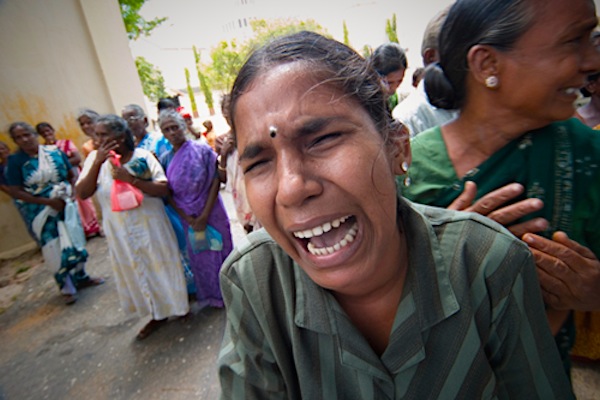Photo courtesy asianews.it
“I was on my motorcycle going through this area behind a couple on a motorcycle. The woman was pregnant and they were out probably to do some shopping. The couple was coming fast. They signalled to me and I moved aside to let them overtake. I suddenly saw the couple fall down for no discernible reason and the man writhing in agony. He had been hit by a bullet from the army’s side. I stopped and the pregnant woman pleaded with me to take her husband to the hospital. Most people passed us by engrossed in their own problems and such things had become a daily occurrence. The man whose lower jaw had been blown off was vomiting blood and the situation looked hopeless. What had happened was that when we passed that area on motorbikes, it was our custom to dip our heads as low as possible to minimise our chances of being hit by an army sniper. Because the man had ridden fast and taken a curve in overtaking me, he lacked the balance to dip his head as a precaution.
The stricken man’s wife was helpless. To carry the man to the medical post at Valaignarmadam required a third person on the bike so that the injured man could be sandwiched between us. My bike being too small for that, I asked the wife to help the man onto the bike so that he could sit behind leaning his head on my back. In this manner I took the man to the hospital. By the time I reached there he was dead. It was then that I noticed my own state. A good part of my person was drenched in blood and covered in flies. The flies formed also a thick layer upon the dead man. This brought home to me the absolute squalor of the place.
I was once travelling on the main road when unexpectedly I saw an RPG shell fired by a soldier across the lagoon landing in front of me. I considered and decided that there was no point in stopping and rode on and another RPG shell fell behind me. I warned people travelling in the opposite direction not to proceed as there was an ambush waiting. But no one seemed to take notice. How does one explain such behaviour? On the one hand there is constant danger from shelling and from small weapons fire and ideally children should be inside bunkers. But on the other, you see children playing on the beach and even flying kites, indifferent to sudden death that strikes unawares.”
UTHR(J), Special Report No: 34, Let Them Speak: Truth about Sri Lanka’s Victims of War, December 2009
Moderating the session with Dr. Abuelaish Izzeldin, the author of I Shall Not Hate: A Gaza Doctor’s Journey on the Road to Peace and Human Dignity at the Galle Literary Festival this year was memorable not so much for what Dr. Izzeldin said, but for the audience reaction. It may have been the only session where the speaker was applauded after every response and received a standing ovation at the end of the session. From the vantage point of the elevated stage, I could see dozens – women as well as men – in tears, or fighting hard against them. The questions had a predictable preface – Dr. Izzeldin’s book made people cry.
With a redesign of The Nation in the offing, columnists were asked to limit their submissions to around 800 words. Around 580 of this column reiterate an inconvenient truth about the human cost of victory. There are hundreds of families, not unlike Dr. Izzeldin’s, not far from where you read this. Dr. Izzeldin survived. Many in Nandikadal did not. Dr. Izzeldin went on to write a book. The horrific stories of those caught between the advancing Sri Lankan Army and the frothing madness of the LTTE aren’t as well-known, even though they are in the public domain. Perhaps grief is easier when its focus is farther away in geography, time or identity? Perhaps the optics and politics of grief, recognition and memorialising – the monuments, statues, renaming of roads, commemorations, garlanding – that take place in the South for war heroes are accepted as more authentic and necessary than the grief of a family in the Vanni whose children were killed or conscripted?
Dr. Izzeldin was visibly moved when he spoke. I remain unconvinced he has come to terms with his own catastrophic loss, and hope he finds peace. For us in this country, we are told we are at peace. Moved by the violence of distant lands, we care not to read our own stories. There are many. Grief is not the exclusive domain of anyone, or any one community. But grief today is unequally recognised, and the space to grieve is unequally framed. If a family in Gaza is able to move us to tears, can 580 words depicting a larger horror move us to tears too?
And if we don’t care enough to read, to ask, to know and to grieve, we must acknowledge that we too are authors of violence.
###
This article was first published in The Nation newspaper on 29 January 2011.
